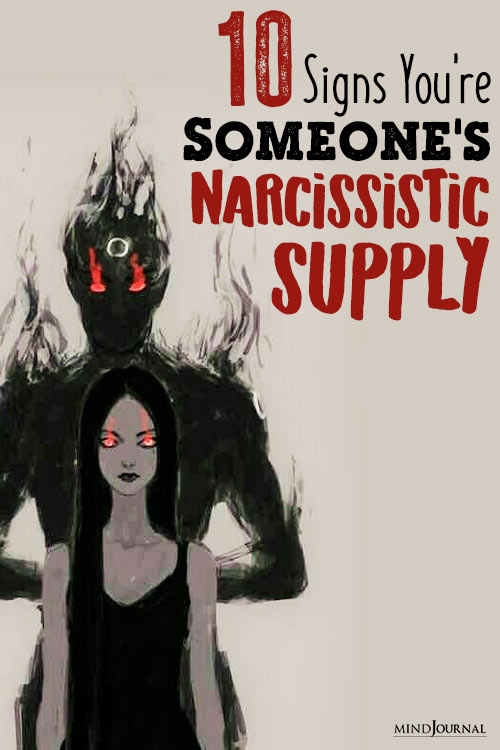What is a narcissistic supply? If you feed a constant supply of admiration and attention to a narcissist, then you’re one!
Narcissists try to create relationships with others where they try to control and manipulate them to feed their egos. Here are 10 warning signs of narcissistic supply and how to heal from it.
Narcissist in a Nutshell
Narcissistic Personality Disorder (NPD) is defined as a “persistent pattern of grandiosity, fantasies of unlimited power or importance, and the need for admiration or special treatment.”
The study found that around 61% of all Americans tend to suffer from Narcissistic Personality Disorder.
They try to create relationships with their friends, family, partners, colleagues, or even acquaintances where they try to project a false image of themselves in order to attract people towards them.
Narcissists try to protect their false sense of self-image and are unable to make any sort of healthy connections with people. Thus, they tend to seek out vulnerable individuals who can feed their constant need for attention and satisfy their egos.

People suffering from Narcissistic Personality Disorder are unable to trust in the goodness of other people.
They are all about projecting a false grand image of oneself, of which they are determined to protect at all costs. Because of this reason, they cannot connect with people in a healthy way. That person uses a type of relationship where they can take care of themselves.
This can form a serious psychological addiction, which can lead to the narcissist demanding or requiring admiration, validation, and limitless special treatment in order to fulfill their sense of self-centeredness or self-entitlement. This is essentially known as narcissistic supply.
So, what is narcissistic supply?
Read more about NPD here Why Do Narcissists Behave The Way They Do
What is a narcissistic supply and how does it work?
Narcissistic people tend to seek out individuals who hold qualities favorable to the narcissistic like a lack of self-confidence, low self-esteem, and emotional vulnerability. These people often have track records of being in narcissistic relationships, either with their parents, friends, or past partners.
They are easy targets of narcissistic people because of their vulnerability and history. The closer these people are to narcissists, the more likely they are going to be used as a means of supply for them.
People who are narcissistic have a desperate need to seek attention. This might be because that person might not have got proper love or care as a child. They harbored feelings of aggression towards their parents or caregivers, such as hate, anger, or envy. They start to develop a dysfunctional or unrealistic sense of self-image, self-worth, and low self-confidence.
Thus, they tend to form relationships with people where they can use them as ‘objects.’ They start to look for emotions or worthiness which they were lacking when they were a child, which helps to feed their “supply.”
Most of these relationships are co-dependent and thus, narcissistic and abusive relationships hardly see the victim, who is also known as the narcissistic supplier, getting any kind of help. However, trained psychologists can see the imprints of a narcissistic person in someone’s life and may be able to provide help.
Read more: 15 Phrases A Narcissist Uses To Compel You To Stay With Them
Types of Narcissistic supply and their sources
People who provide narcissists with attention and fulfill their egos on a daily basis are known narcissistic supply sources. These can include any person the narcissist has made close relations with, like their spouse, colleagues, friends, business partners, family or relatives, and so on. However, the first and primary form of a narcissistic supply is attention.
Here attention comes in both private (adoration, applause, adulation, repulsion, fear) and public (fame, infamy, celebrity, notoriety) forms.
The attention of any type or kind, be it negative or positive can constitute the primary narcissistic supply. Here the individual considers being infamous as good as being famous or being renowned as important as being notorious. The narcissistic person is satisfied as long as there are people who believe in them.
Some triggers of this kind of supply may come from being famous, having a lot of money or authority, having sex, and deriving a sense of masculinity or femininity from it.
Sources of this kind of supply can be anyone who provides the narcissistic with casual attention on a random basis.
The second type of narcissistic supply is called Secondary Narcissistic Supply and includes leading normal lives, having financial and social security, and attaining companionship.
Thus, possessing significant wealth, having a sexual partner, owning a business, obtaining professional recognition, being successful in life, owning property, and flaunting one’s symbols of status also constitute triggers for secondary narcissistic supply.
Sources of this kind of supply are spouses, colleagues, friends, teachers, business partners, relatives, neighbors, and so on.
Also read: Nature Or Nurture: Are Narcissists Born Or Made?
10 Warning Signs You Are Narcissistic Supply

Here are ten signs of narcissistic supply:
1. They constantly rebuke your real identity
A narcissist will often make the other person or the supplier feel like they are not worthy enough as individuals. They will constantly try to suppress their real identities and emotions by telling them things like “I know who you are”, or “You are just not that person.” This causes a lot of narcissistic suppliers to lose their sense of identity, which makes it easier for the narcissist to manipulate and control them.
2. You are the giver in the relationship
A healthy relationship comprises both individuals catering to each other’s needs and looking out for one another. However, in a narcissistic relationship, you tend to be doing all the work. At the start, a narcissistic person will act pleased when you help them. However, soon they take you for granted and start to expect things from you. They will be ready to show their displeasure to you in case you cannot fulfill their desires. They start taking advantage of people who have poor boundaries set for themselves and prey on their willingness to please people.
3. You get fatigued and exhausted trying to please the narcissist

The longer you maintain a relationship with these individuals, the more responsibilities get heaped on you and less on the part of the narcissist. When difficulties arise, that person expects you to solve and overcome them. From managing finances, household chores, children, and other responsibilities, you try hard to portray your love for them and show them that you are really trying and putting in effort. However, you forget to realize that it is only you who is giving your all.
4. You are willing to change yourself in order to please them
The first sign of this is when a narcissist expects you to change your appearance to what you like most. This can range from changing the way you dress to the way you talk or do your hair. This is usually a test for a narcissist to see if you are willing to bow down to their demands. A narcissistic person does this by comparing you to other people and telling you how they are better in some way or the other.
Then comes the emotional part where they expect you to change your thoughts, beliefs, and knowledge in a way that would suit them the most.
They can start by telling you that you are overweight, you do not look good enough for them, or indicate some things about you that you are not willing to change but are forced to do so. The end result is you are left feeling as if you are not good enough for them. And this is exactly what a narcissist wants to do by taking the upper hand and letting their partners doubt their own sense of self.
5. You develop cognitive dissonance
This is characterized by your mind experiencing two conflicting thoughts at the same time. You might feel that they love you but do not expect you to be happy. When you start a conversation with them about this, they simply flip the tables on you and start accusing you of being selfish and self-centered. Thus, these things do not make sense to you and you live in constant confusion and are never able to truly communicate what you feel.
6. They will use rejection as a means of testing you
Narcissists are insecure individuals who need constant assurance that they are being loved and cared for. They might text you back after a long time and rebuke you when you do the same.
They will talk about other people in front of you and how they provide more to their lives than you. They will constantly remind you of your shortcomings and how there are numerous people in their lives and you are just one of them. This creates confusion in you as you thought you were special to them and will keep on trying to win their love or attention back.
7. They will try to induce a sense of shame in you
A narcissist will always try to project their negative emotions on the other person. They get insecure when their partner reaches a level of security or achieves something significant in their lives and see it as a potential threat to their relationship.
For example, getting a good job or hanging out with your friends might make them jealous and they will not fail to make you feel ashamed for this. This makes you retreat into your familiar mental agony and wonder what you did to make them upset.
8. They make you doubt your sanity

Most narcissists like to emotionally manipulate people. They get attracted to people who are kind, generous, and peaceful. However, all they really want to do is erase those qualities from that individual.
Over time, they continue to manipulate your feelings and when they start an argument, and you get angry, they pinpoint the blame on you, saying you are the one blowing up. This makes you doubt your sanity as you are a peaceful and kind person.
Over time, you start to believe that you are the root of all problems and will try harder to please the narcissist, thus creating a vicious cycle.
9. You develop addiction and engage in self-destructive behavior
You develop addictions to drugs, cigarettes, or alcohol. This might be your coping mechanism for creating a safe haven for yourself, away from all that emotional anguish and trauma that the narcissist creates.
You also stray away from your friends or family and make poor or no choices at all for your career, which suits the narcissist well as now you are vulnerable and only have them for your supposed comfort.
10. Anxiety and depression
Over a period of time, the narcissist supplier will develop anxiety from prolonged emotional abuse.
The narcissist also takes advantage of this situation to present himself as the superior one in social situations while the supplier is in an emotional mess.
This creates a negative association in their brains regarding social situations and they are forced to believe that they are the inferior ones in the relationship, which can also cause depression.
Also read: 10 Tips On How To Spot A Narcissist On The First Date
Narcissistic Supply Cut Off: How to start the healing process

The first and foremost step to healing yourself is to recognize the situation. Try to look at your scenario from a different perspective and ask yourself, “Is this really right”, or “Is this what I really wanted.” You should trust your gut and recognize a situation when it does not feel right. Only when you understand how you are being used by a narcissist for his/her narcissistic supply, then can you start your healing process.
The most effective solution for healing from a narcissist is to stay as far away from them as possible and cut them off from your life completely. This is better said than done, as since you are their “primary supply”, they will leave no stone unturned to emotionally manipulate or put you back into your place again.
In situations like these, it is important to reach out to friends or family for support. If you feel threatened by their presence, you can even reach out to your local law enforcement for help. Your absence will not matter to a narcissist for a long time as they will find someone else to fill your gap. You can start feeling lonely and depressed in situations like these.

Read more: How To Disconnect From A Narcissist Using The ‘Observe, Don’t Absorb’ Technique
However, it is important that you remember past loving relationships in these situations and understand that the future holds numerous probabilities for you to experience the feeling of love and affection once more.
Wrapping it up
A narcissist is dependent on a regular, continuous flow of narcissistic supplies. They rely on it to sustain their superficial self-image and feed their ego. People in interpersonal relationships with such individuals are merely used as a means of extension of their self-serving needs.
If you feel like you are being used as a narcissistic supply, it is important to remember that you are not alone and professional help can always guarantee you getting out of such relationships, both physically and emotionally.
We hope this blog “What Is A Narcissistic Supply? 10 Warning Signs You’re One”, has proved to be insightful to you. Please share it with others and don’t forget to leave a comment below!
Frequently Asked Questions (FAQs)
How do you know if you are narcissistic supply?
People who provide narcissists with attention and fulfill their egos on a daily basis are known narcissistic supply sources. So if you are the giver in the relationship and can be manipulated or controlled easily, it can be identified as signs you narcissistic supply.
What happens when you cut off narcissistic supply?
If you deny a narcissist from their source or don’t give them attention, they may become enraged, they can be toxic or abusive. The best way is to cut them off gradually and save yourself from the trouble.













Leave a Reply